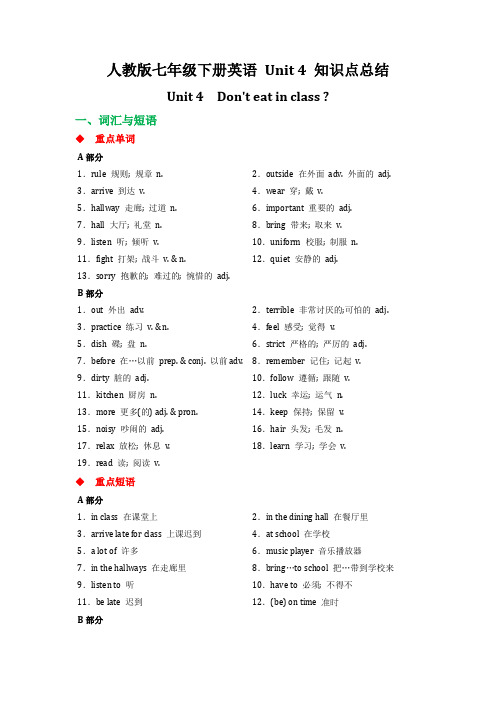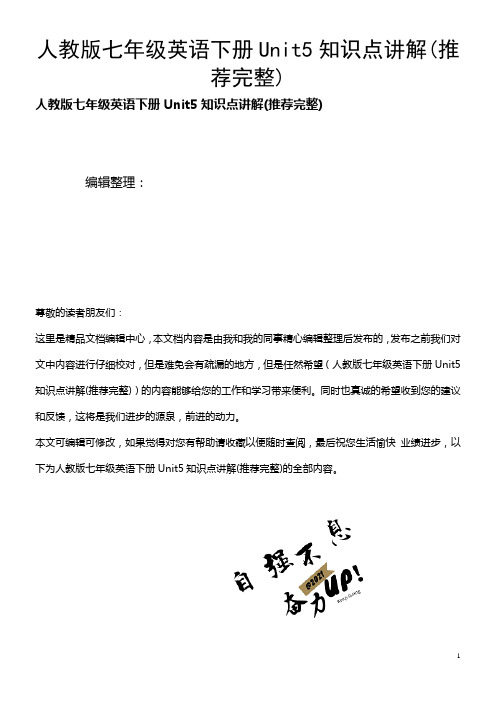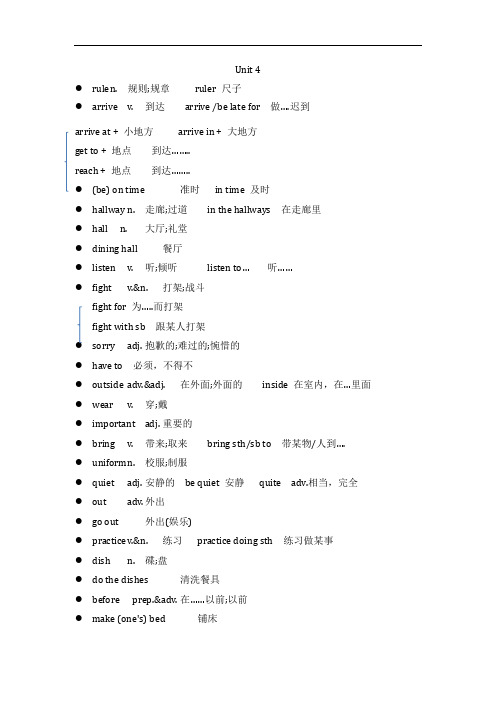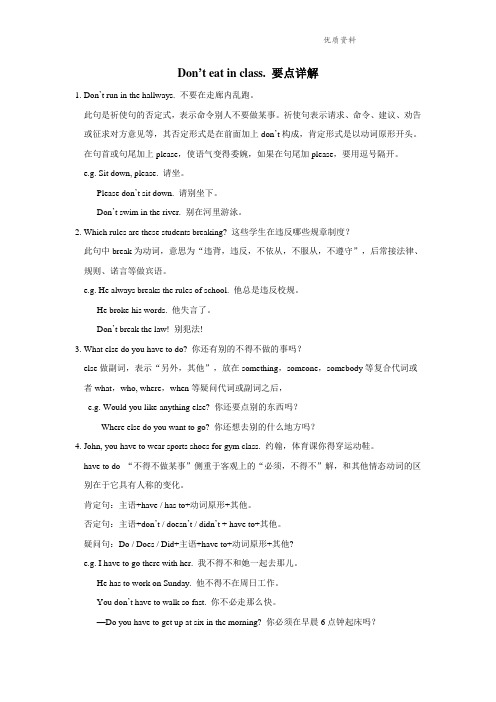提分干货人教版七下英语Unit4-5单元课文难点解析,这些重点必须掌握!
最全面人教版七年级下册英语第四单元知识点归纳总结

人教版七年级下册英语Unit 4 知识点总结Unit 4 Don't eat in class ?一、词汇与短语◆重点单词A部分1.rule 规则; 规章n.2.outside 在外面adv. 外面的adj. 3.arrive 到达v.4.wear 穿; 戴v.5.hallway 走廊; 过道n.6.important 重要的adj.7.hall 大厅; 礼堂n.8.bring 带来; 取来v.9.listen 听; 倾听v.10.uniform 校服; 制服n. 11.fight 打架; 战斗v. & n.12.quiet 安静的adj.13.sorry 抱歉的; 难过的; 惋惜的adj.B部分1.out 外出adv.2.terrible 非常讨厌的;可怕的adj. 3.practice 练习v. & n.4.feel 感受; 觉得v.5.dish 碟; 盘n.6.strict 严格的; 严厉的adj. 7.before 在…以前prep. & conj. 以前adv.8.remember 记住; 记起v. 9.dirty 脏的adj.10.follow 遵循; 跟随v. 11.kitchen 厨房n.12.luck 幸运; 运气n.13.more 更多(的) adj. & pron.14.keep 保持; 保留v. 15.noisy 吵闹的adj.16.hair 头发; 毛发n.17.relax 放松; 休息v.18.learn 学习; 学会v.19.read 读; 阅读v.◆重点短语A部分1.in class 在课堂上2.in the dining hall 在餐厅里3.arrive late for class 上课迟到4.at school 在学校5.a lot of 许多6.music player 音乐播放器7.in the hallways 在走廊里8.bring…to school 把…带到学校来9.listen to 听10.have to 必须; 不得不11.be late 迟到12.(be) on time 准时B部分1.too many 太多的2.go out 外出(娱乐)3.on school nights 在上学期间的晚上4.practice the guitar 练习吉他5.do the dishes. 清洗餐具6.make breakfast 做早饭7.make one's bed 铺床8.read a book 看书9.think about 考虑10.be strict (with sb.) (对某人)要求严格11.follow the rules 遵守规则12.good luck 祝好运◆重点句子A部分1.Don't arrive late for class. You must be on time. 不准上课迟到,务必守时。
(2021年整理)人教版七年级英语下册Unit5知识点讲解

人教版七年级英语下册Unit5知识点讲解(推荐完整)编辑整理:尊敬的读者朋友们:这里是精品文档编辑中心,本文档内容是由我和我的同事精心编辑整理后发布的,发布之前我们对文中内容进行仔细校对,但是难免会有疏漏的地方,但是任然希望(人教版七年级英语下册Unit5知识点讲解(推荐完整))的内容能够给您的工作和学习带来便利。
同时也真诚的希望收到您的建议和反馈,这将是我们进步的源泉,前进的动力。
本文可编辑可修改,如果觉得对您有帮助请收藏以便随时查阅,最后祝您生活愉快业绩进步,以下为人教版七年级英语下册Unit5知识点讲解(推荐完整)的全部内容。
人教版七年级英语下册Unit5知识点讲解(推荐完整)编辑整理:张嬗雒老师尊敬的读者朋友们:这里是精品文档编辑中心,本文档内容是由我和我的同事精心编辑整理后发布到文库,发布之前我们对文中内容进行仔细校对,但是难免会有疏漏的地方,但是我们任然希望人教版七年级英语下册Unit5知识点讲解(推荐完整) 这篇文档能够给您的工作和学习带来便利。
同时我们也真诚的希望收到您的建议和反馈到下面的留言区,这将是我们进步的源泉,前进的动力。
本文可编辑可修改,如果觉得对您有帮助请下载收藏以便随时查阅,最后祝您生活愉快业绩进步,以下为〈人教版七年级英语下册Unit5知识点讲解(推荐完整)〉这篇文档的全部内容。
Unit 5 Why do you like pandas?本单元重点短语kind of 有点,稍微 a kind of 一种want sb to do sth 想要某人做某事 want sth 想要某物let sb do sth 让某人做某事 like to do sth 喜欢做某事play with 与。
..一起 have a look it 。
..看。
..every day 每天(be) made of 由。
.。
制成的cut down 砍倒 be quiet 安静get lost 迷路 be in (great)danger 处于(极大)危险中本单元日常用语归纳1.-—Why do you like pandas? 你为什么喜欢熊猫?---Because they’re very cute.因为它们非常可爱。
最新人教版七年级下册英语Unit4知识点

人教版七年级下册英语Unit4知识点名词:人教版七年级下册英语Unit4知识点hall 大厅;礼堂dish 碟;盘kitchen 厨房luck 幸运;运气hair 头发人教版七年级下册英语Unit4知识点人教版七年级下册英语Unit4知识点listen 听wear 穿;戴bring 带来;取来relax 放松;休息read 读;阅读feel 感受;觉得remember 记住follow 遵循;跟随keep 保持;保留learn 学习;学会人教版七年级下册英语Unit4知识点人教版七年级下册英语Unit4知识点important 重要的quiet 安静的dirty 脏的noisy 吵闹的terrible 非常讨厌的;可怕的strict 严格的;严厉的人教版七年级下册英语Unit4知识点out 外出兼类词:人教版七年级下册英语Unit4知识点practice v&n 练习outside adv 在外面 adj 外面的more adj&pron 更多的before prep&conj 在……以前;adv 以前人教版七年级下册英语Unit4知识点人教版七年级下册英语Unit4知识点dining hall 餐厅listen to 听have to 必须;不得不go out 外出(娱乐)do the dishes 清洗餐具make one's bed 铺床follow the rules 遵守规则be strict with sb 对某人要求严格人教版七年级下册英语Unit4知识点1、rule 规则可数名词人教版七年级下册英语Unit4知识点family rules 家规class rules 班规traffic rules 交通规则人教版七年级下册英语Unit4知识点follow the rules 遵守规则break the rules 违反规则2、arrive 到达arrive at + 小地方arrive in + 大地方arrive home/here/there 到家/到这/到那I usually arrive at the bus station at 6:30 every morning. 我通常在每天早上六点半到达公交车站. When did you arrive in Shanghai?你什么时候到达的上海?He arrives home late every day. 他每天都很晚到家.Tom每天早上7点到学校.3、(be)on time 准时;按时(按规定时间)Don't worry. The train will arrive on time. 别担心.火车回准时到达的.The plane takes off on time. 飞机按时起飞.in time 及时(不迟到或接近规定时间)His car arrives in time. 他的车及时赶到.这个会议准时召开.The meeting starts4、 Listen!听!listen to + 人/物听到……Listen!Someone is calling for help. 听!有人在呼救!Please to listen to me. 请听我说.He likes listening to rock music. 他喜欢听摇滚音乐.Lucy喜欢听轻音乐.5、 in class 在上课in the class 在班上;在班级里in the classroom 在教室里He is active in class. 他在课上很积极.He is the best student in the class. 他是班上最优秀的学生.Don't eat in the classroom. 不要在教室里吃东西.6、 bring 带来;取来从别处带到说话人这边take 带走;拿走从说话人这边带到别处bring sb/sth to + 地点把某人/某物带到某地bring sb sth = bring sth to sb 给某人带来某物take sb/sth to + 地点把某人/某物带去某地Bring your ID card to school. 把你的身份证带到学校来.He brings me a big cake. = He brings a big cake to me. 他给我带来了一个大蛋糕.You should take her to school. 你应该带她去学校.Tom给Lily带了一本书.7、wear 穿;戴 + 衣服/鞋/帽子/手套/袜子/围巾/首饰/眼镜/胡子/假发等,强调穿着打扮的状态put on +衣服/鞋/帽子/手套/袜子/围巾,强调穿戴时的动作She wears a T-shirt. 她穿着一件T恤.It's cold. You should put on your coat. 天太冷了.你应该穿上大衣.Mary戴着眼镜.Mary glasses.8、practice sth 练习某事practice doing sth 练习做某事Let's practice English. 让我们来练习英语吧.Let's practice speaking English. 让我们来练习说英语吧.让我们来练习踢足球吧.9、before 在……之前;前面表示时间:before 在……之前反义词:after 在……之后表示位置:before 在……前面反义词:behind 在……后面You must go to bed before 10 o'clock. 你必须在10点之前上床睡觉.There is a desk before me and a chair behind me. 前面有一张课桌,后面有一把椅子.10、relax v 放松;休息Please relax. 请放松.relaxed 感到放松的,修饰人I feel relaxed. 我感到很放松.relaxing 使人放松的,修饰物The movie is relaxing. 这部电影使人放松.11、strict 严格的;严厉的Mr. Li is a strict person. 李先生是一个严格的人.be strict with sb 对某人要求严格be strict in sth 对某事要求严格Teachers are strict with students. 老师对学生严格.She is strict in her work. 她对待工作要求严格.12、remember 记住;记得反义词:forget 忘记I remember your phone number. 我记得你的电话号码.I forget your phone number. 我忘了你的电话号码.remember to do sth 记得去做某事(还没做)remember doing sth 记得做过某事(做完了)Please remember to turn off the light before you leave the room. 离开房间前请记得关灯.(还没关灯)I remember posting the letter to you. 我记得给你寄出了这封信.(已经寄了)13、Do型祈使句肯定句:动词原形(+ 物/事)+ 其他.否定句:Don't + 动词原形(+ 物/事)+ 其他.Wear the school uniforms on weekdays, please. 上学日请穿校服.Don't watch TV before dinner. 晚饭前不要看电视.Don't eat in the classroom. 教室里不能吃东西.14、情态动词have to 和must后面都跟动词原形(1)相同点:两者都表示“必须”,(2)不同点:① must表示主观必须;have to表示客观必须,不得不② must没有形式变化;have to三单使用has to(3)肯定句:人/物 + must/have to/has to + 动词原形 + 其他We must wear school uniforms on weekdays. 我们上学日必须穿校服.We have to leave now. 我们不得不现在走.Tom has to take the bus. Tom不得不乘公交车.(4)否定句:人/物 + mustn't + 动词原形 + 其他人/物 + don't/doesn't have to + 动词原形 + 其他.We mustn't wear school uniforms on weekdays. 我们上学日不是必须穿校服.We don't have to leave now. 我们不必现在走.Tom doesn't have to take the bus. Tom不必乘公交车.(5)must的一般疑问句:Must + 人/物 + 动词原形 + 其他?肯定回答:Yes, 人/物 + must.否定回答:No, 人/物 + needn't.—Must I leave now?我现在必须离开吗?—Yes, you must./No, you needn't.1.Good (运气)to you!2.—Can we eat in the classroom?—No, we can't. But we can eat (外面)3.Don't (打架)with him.4.After breakfast, the girl never leaves the dirty (盘子)in the kitchen.5.You can (放松)and watch TV after fishing your work.6.English is very i . We must learn it well.7.Don't be (吵闹的).You have to keep q in the library.8.Cindy has to brush her shoes because they are d .9.My mother is making dinner in the k .10.My sister always w her school uniform on school days.11.—Please (记住)to call me this evening.—OK, I will.12.We need to go to school (准时).13.There are no buses or taxi here, so she walk home.14.Tom (练习)playing the violin every night.15.His father is (严厉的)him.16.You can't watch TV (之前)you finish your homework.17.(not talk). It's time for class.18.David, (不要)make trouble at school.19.你可以在音乐教室里听音乐.You can in the music room.20.在上学期间的夜晚我不能外出.I can't on school night.21.我妈妈经常帮我整理床铺.My mother often helps me .22.请你把餐具洗一下好吗?Could you please ?。
人教版英语七年级下册 Unit 4 ---6期中重难点复习

Unit 4语法:祈使句祈使句的概念:表达说话人对对方的劝告、叮嘱、请求或命令等。
因此,祈使句中一般没有主语,但根据其句意,实际上是省略了主语you。
特点:祈使句句末用感叹号或句号,朗读时,常用降调。
在表达请求或劝告时,在祈使句前或句末可加上please,以使句子的语气更加缓和或客气。
祈使句一般没有时态的变化,也不能与情态动词连用。
语法:祈使句的肯定句式祈使句的肯定句式一般分为以下三种类型:1. Do型。
结构:实意动词的原形+(其它成分)e.g. Go! 走!/出发!e.g. Leave, please! 请离开!e.g. Go home after school. 意译:放学给我回家。
2. Be型。
结构:be动词+表语(形容词、名词或介词短语等) +(其他成分)。
e.g. Please be quiet! 请安静。
e.g. Be a good boy! 做个乖孩子。
e.g. Be good to people, please. 请友好待人。
e.g. Be careful when you cross the street.过马路时要小心。
3.Let型。
结构:Let+宾语+动词原形+(其它成分)。
例如:e.g. Let it go. 随它吧。
e.g. Let’s go now. 让我们现在就出发吧。
e.g. Let us go home, please. 请让我们回家吧。
(啰嗦:注意let us与let’s的区别)语法:祈使句的否定句式祈使句的否定句式,通常情况下在句首加上Don’t,一般分为以下四种类型:1.Do型与Be型句首加Don’t。
e.g. Don’t say that again! 别再那样说了!e.g. Don’t come back! 别回来了!e.g. Don’t be loud. 别吵。
e.g. Don’t be sad. 别难过了。
e.g. Don’t be afraid of me. 别怕我。
人教新目标英语七年级下册unit4--5知识点总结

人教新目标英语七年级下册知识点归纳总结unit 4 Don’t eat in class.Section A1. arrive late for 迟到,侧重到达的时间晚be late for 迟到侧重于状态arrive late for class/school. = be late for class/school. 上课/上学迟到2.on time准时按规定时间或指定时间做某事不早不晚in time及时不迟到或在规定时间之前或接近所规定时间做某事没有迟到,时间还充裕He always go to school on time.他总是按时上学。
Fireman reached the house on fire in time.消防员及时赶到那幢失火的房子。
3.祈使句表示请求,命令或建议祈使句无主语,主语you常省去,动词原形谓语当,句首加don’t否定变朗读应当用降调,句末常标感叹号。
肯定的祈使句(1)实义动词原形+其他Have a seat here. 请这边坐。
(2)be动词原形+形容词+其他Be a good boy!(3)Let sb do sth. Let me help you. 让我来帮你。
(4)有的祈使句在意思明确的情况下,动词可省略。
This way, please. = Go this way, please. 请这边走否定的祈使句(1)Don’t+实义动词+原形Don’t forget me!不要忘记我!(2) Don’t be+形容词+其他Don’t be late for school!上学不要迟到!(3) Don’t let sb do sth Let +宾语+ not + 动词原形+其它成分Don’t let him go. / Let him not go.别让他走。
(4) No+Ving. No smoking! 禁止吸烟! No fishing! 禁止钓鱼4. hear listen sound 听hear听说侧重于听的内容I'm sorry to hear that you are ill. 听说你生病了我很难过。
人教版丨七下英语Unit4-5单元课文难点解析

人教版丨七下英语Unit4-5单元课文难点解析Unit4 Don’eat in class.Section A1.Don’t arrive late for class. You must be on time. 上课不要迟到,你必须准时【解析1】⑴arrive v 到达,抵达arrive in+ 大地点/arrive at + 小地点=reach+地点=get to +地点到达某地( )①Betty arrived____ London _____ the morning of June 1st.A. at; inB. at; onC. in; inD. in; on( ) ②My father arrived ____ Beijing ___ a cold morning.A. in; inB. at; inC. in; on( )③—When did you ___ there?—The day before yesterday.A. arrive inB. get toC. reach【注】:如果arrive/get 后接地点副词( here, there , home等)时,介词要省略。
get home 到家arrive there 达到那里【解析2】be late for “迟到”(固定短语)( ) Jim is often _____ for school.A. lateB. latelyC. laterD. much lately【解析3】on time/ in time(1) on time= at the right time “准时,按时”(不早不晚)The train came in on time. 火车准时进站(2) in time 指“及时”,表示动作在规定的时间内或提前发生。
You’ll get there just in time . 你会及时到达那儿的。
2. Don’t fight . 不要打架。
人教版新目标英语七年级下册Unit4--5知识点

Unit 4 Don't eat in class.单元话题:本单元讨论规章制度。
要求学生描述学校和班级的一些规章制度,并能听读以规章制度为话题的听力材料,能读懂这一话题的文章,并以书面形式描述学校和班级的一些规章制度。
重点词组:1.(be) on time 准时2.dining hall 餐厅3.listen to 听4.eat outside 在外面吃5.wear a hat 戴着帽子6.have to do sth. 不得不做某事7.go out外出(娱乐)8.do the dishes清洗餐具9.make one’s bed 铺床10.be strict with (sb.) (对某人)要求严格11.in the hallways 在走廊里12.school uniform 校服13.be quiet保持安静14.follow the rules 遵守规则15.too many 太多16.in class 在上课17.make rules 制定规则重点讲解:1.have to 表示“必须,不得不”,后跟动词原形,但当主语是第三人称单数时,要用has如:①We have to wear uniforms on Mondays. ②She has to finish her homewok.2.too many表示“太多”,后加可数名词复数。
如:There are too many rules in our school. too much 也表示“太多”,后跟不可数名词。
如: We have too much work to do. much too表示“太……”,后面加形容词和副词。
如:You eat much too quickly.3.be strict with sb. 表示对某人要求严格。
如:My mother is strict with me.be strict in sth. 表示对某事要求严格。
人教版(五四制)七年级下英语各单元重难点归纳

人教版(五四制)七年级下英语各单元知识点汇编Unit1 单元重难点归纳一、重点单词anyone,anywhere,someone, wonderful,few, most ,something, nothing, everyone,myself,yourself,seem,bored,diary,activity,decide,try,wonder,difference,dif ferent,wait,top,wet,below,enough,dislike,taste,bored(修饰人),boring(修饰物),feed(过去时fed)二、重点词组及固定搭配1、待在家:stay at home.拜访我的叔叔:visit my uncle参观博物馆:visit museums去海滩:go to the beach2、去度假:go on vocation3、出去:go out4、复习备考:study for tests5、好久不见:Long time no see.6、记日记:keep a diary7、有趣的事情:something interesting8、大部分时间:most of the time9、许多:quite a few10、给某人买某物:buy sth for sb=buy sb sth11、照相:take photos=take pictures12、玩得开心:have a good time=have fun=enjoy oneself13、去购物:go shopping=do some shopping14、nothing….but….:除…之外什么也没有15、seem+形容词:看起来…..seem+to do sth:似乎、好像要做某事It seems/seemed+从句:好像、似乎…….16、arrive in..:表示到达计较大的地方,比如国家,省arrive at….:表示到达比较小得地方,如商店,机场17、决定做某事:decide to do sth18、尝试着做某事:try doing sth尽力去做某事:try to do sth19、感觉到:feel like…///(想要做某事:feel like doing sth)想要做某事:want to do sth20、喜欢做某事:enjoy doing sth=like doing sth21、too many:太多,后接可数名词复数too much:太多,后接不可数名词22、because of:因为,由于。
人教7年级下册 Unit 4--5 知识点讲解+语法讲解

Unit 4 Don’t eat in class.Section A1.rule <Cn.> 规则;规章复数:________名词短语:school/class/family/traffic rules校规/班规/家规/交通规则= the rule(s) of school/class/family/traffic校规/班规/家规/交通规则动词短语:make a rule = make rules制定规则follow/obey the rules遵守规则break a rule违反规则Eg: Everyone should follow class rules.=Everyone should follow the rules of the class. 每个人都应该遵守班规。
2.arrive <vi.>到达arrive late for = be late for迟到前者侧重动作,后者侧重状态。
Eg: Don’t arrive late fo r the meeting next time. 下次开会别迟到了=Don’t be late for the meeting next time.复习:arrive,reach与get特殊:get home/here/therearrive home/here/thereEg: I get to Beijing. 我到北京啦。
= I arrive in Beijing.= I reach Beijing.Eg: Tom always ____________________ his office on time.汤姆总是按时到办公室。
We _________________to school at 7:00 every morning.我们每天早上7点到校。
3. 辨析:on time与in timeEg: The train arrives on time.火车准时到达。
七年级下unit4重点知识点

七年级下unit4重点知识点七年级下Unit 4重点知识点本篇文章将系统地讲述七年级下Unit 4的重点知识点,包括语法、词汇等方面的内容。
希望能够帮助大家更好地掌握这个单元的知识。
一、语法1. 一般过去时在一般过去时中,动词要变成过去式。
其中,大多数动词在词尾加-ed,如:walked、played等。
但也有一些不规则动词需要特别记忆,如:go-went、have-had等。
在句子结构上,一般过去时通常需要使用时间状语,如:yesterday、last week等。
2. 现在完成时现在完成时表示过去某个时间发生的事情对现在的影响。
构成方式为“have/has+动词的过去分词”。
例如,“I have seen this moviebefore.” 中的seen就是过去分词。
在句子中,现在完成时也通常需要使用时间状语,如:ever、never等。
3. 一般将来时一般将来时表示将要发生的事情。
构成方式为“will/shall+动词原形”。
例如,“I will go to Beijing tomorrow.” 中的will表示将来时。
另外,一般将来时还可以通过be going to+动词原形的形式来表示。
二、词汇1. 基本词汇本单元的基本词汇包括:waiter、menu、dish、salad、steak、seafood、order、bill、tip等。
这些词汇都与餐厅用餐有关。
2. 重点词汇除了基本词汇外,还有一些重点词汇需要注意掌握。
例如:(1) 常见的动词短语:make a decision、take a vacation、get together等。
(2) 形容词:delicious、terrible、expensive、cheap等。
(3) 副词:usually、sometimes、always等。
(4) 其他词汇:healthy、hungry、thirsty等。
三、阅读理解本单元的阅读理解主要涉及餐厅用餐和旅游方面的内容。
人教版七年级下Unit 4 ---6重难点复习

Unit 4●rule n.规则;规章ruler 尺子●arrive v.到达arrive /be late for 做….迟到arrive at + 小地方arrive in + 大地方get to + 地点到达……..reach + 地点到达……..●(be) on time准时in time 及时●hallway n.走廊;过道in the hallways 在走廊里●hall n.大厅;礼堂●dining hall餐厅●listen v.听;倾听listen to…听……●fight v.&n.打架;战斗fight for 为…..而打架fight with sb 跟某人打架●sorry adj.抱歉的;难过的;惋惜的●have to 必须,不得不●outside adv.&adj.在外面;外面的inside 在室内,在…里面●wear v.穿;戴●important adj.重要的●bring v.带来;取来bring sth/sb to 带某物/人到….●uniform n.校服;制服●quiet adj.安静的be quiet 安静quite adv.相当,完全●out adv.外出●go out外出(娱乐)●practice v.&n.练习practice doing sth 练习做某事●dish n.碟;盘●do the dishes清洗餐具●before prep.&adv.在……以前;以前●make (one's) bed铺床●dirty adj.脏的●kitchen n.厨房●more adj.&pron.更多(的)●noisy adj.吵闹的noise n.喧嚣声,噪音●relax v.放松;休息relaxed/relaxing adj. 轻松的(人用ed,物用ing)●read v.读;阅读●terrible adj.非常讨厌的;可怕的●feel v.感受;觉得●strict adj.严格的;严厉的be strict with sb对某人要求严格be strict in sth对某事要求严格●remember v.记住;记起remember to do 记得要做某事remember doing 记得做过某事●follow v.遵循;跟随●follow the rules遵守规则●luck n.幸运;运气good luck!/good luck to you ! 祝你好运!●keep v.保持;保留keep+宾语+ adj 使….保持…状态keep the classroom cleankeep doing 保持做….●hair n.头发;毛发keep one’s hair short 留短发●learn v.学习;学会learn to do 学习做某事●have fun = have a good time 玩的开心have fun doing 做某事很开心祈使句:1)Do 型:Go and wash your hands.2)Be 型:Be quiet, please.3)Let 型:Let me help you.否定形式:1)Do 型、Be 型在句首加Don’tDon’t forget me.Don’t be late for school.2)Don’t let……或let…not….Don’t let him go. = let him not go.3)No 开头No speaking.七年级下Unit5Section AI. Key words1. zoo n.动物园scared adj.吓人的(修饰人)2. panda n.熊猫14. kind n. 种类adj. 和蔼的:宽容的3. tiger n. 老虎15. Australia n.澳大利亚4. elephant n.大象Australian adj.澳大利亚的;n.澳大利亚人5. koala n.树袋熊;考拉16. south n.南:南方adj.南6. lion n.狮子southern adj.南方的7. giraffe n.长颈鹿southerner n.南方人8. animal n.动物north n.北;北方9. cute adj.可爱的west n.西:西方zy adj.懒惰的:懒散的east n.东;东方lazily adv.懒惰地laziness n.懒惰17. African.非洲11. smart adj.聪明的18. pet n.宠物clever adj.聪明的:机灵的19. leg n.腿12.beautiful adj. 美丽的;美好的20. cat n.猫beautifully adv.美好地:漂亮地21. sleep v./n.睡觉beauty n.美丽sleepy adj.欲睡的13. scary adj.吓人的;恐怖的( 修饰物) asleep adj.睡着的II. Phrases1. my favorite animal我最喜欢的动物walk on one's hands用手行走2. my new pet我的新宠物walk on one's knees跪着走3. really scary真的恐怖8. sleep all day整天睡觉4. kind of有点儿;稍微9. 非常喜欢某事(物)kind of interesting有点儿有趣like sth. a lota kind of 一种=like sth. very muchall kinds of各种各样的10. be scared of sth. / doing sth.害怕某5. very cute非常可爱事/做某事be scared to do sth.害怕做某事6. be from South Africa 11. an elephant 一头大象= come from South Africa 产自南非 a white elephant 一头白象7.walk on two legs用两条腿走路III. Sentences1.你为什么喜欢熊猫?因为他们有点儿意思。
七年级下册英语第四单元知识点

七年级下册英语第四单元知识点英语是一门国际通用语言,在现代社会中扮演着举足轻重的角色。
对于初学者来说,七年级下册英语第四单元是一个非常关键的阶段。
以下是一些关于该单元知识点的讨论。
第一部分:听力技巧在七年级下册英语第四单元中,听力技巧是至关重要的一部分。
学习者需要通过听力练习来提升自己的听力能力。
这可以通过大量听英语原声音频,如听收音机、看英语电影或电视剧来实现。
此外,还需要做一些听力练习,例如听力理解题和对话填空等。
第二部分:词汇记忆词汇是学习一门语言的基础,对于初学者来说更是如此。
在七年级下册英语第四单元中,学习者需要掌握并记忆大量的词汇。
为了更好地记忆这些词汇,可以采用一些记忆技巧,例如使用词汇卡片或制作词汇表。
此外,可以利用闪卡法进行复习,将词汇分为不同的分类进行记忆。
第三部分:语法知识语法是英语学习中的重要组成部分。
在七年级下册英语第四单元中,学习者需要掌握一些基本的语法知识,例如动词的时态、名词的单复数和代词的用法等。
为了更好地掌握这些语法知识,学习者可以通过阅读英语语法教材和做相关的练习来提高自己的语法水平。
第四部分:口语表达口语表达是学习英语的重要环节。
在七年级下册英语第四单元中,学习者需要通过口语练习来提高自己的口语水平。
为了更好地练习口语,可以加入英语角或参加英语口语训练班,与其他学习者进行对话练习。
此外,还可以通过模仿英语原声音频来提升自己的口语表达能力。
第五部分:写作能力写作是英语学习中的一项重要技能。
在七年级下册英语第四单元中,学习者需要学习如何写作简单的英语文章,例如写日记、写信等。
为了提高自己的写作能力,学习者可以多做写作练习,例如写一些简单的句子或段落。
同时,还可以通过阅读英语原版书籍和写作指导书籍来提高写作技巧。
总结起来,七年级下册英语第四单元是初学者学习英语的重要阶段。
通过提升听力技巧、记忆词汇、掌握语法知识、提高口语表达和写作能力,学习者可以更好地掌握英语,进一步提高自己的语言水平。
七年级英语Unit Four 、Unit Five人教四年制版知识精讲

七年级英语Unit Four 、Unit Five人教四年制版【同步教育信息】一. 本周教学内容:Unit Four Lesson 23—24 Fun StoryUnit Five Lesson 25—26二. 重点词语及表达:1. do bad things to …做对……不利的(没有好处的,坏的)事情例:We should not do bad things to others . 我们不应当对别人做坏事。
be bad for … 对……有害处例:Reading in bed is bad for your eyes . 躺床上看书对你的眼睛有害。
2. keep(1)keep +物(人)+形容词,使某物或某人处于某种状态,保持例:We must keep our classroom clean . 我们必须保持教室干净。
Good food keeps you healthy . 良好的食物使你身体健康。
(2)keep+物(人)+介词短语,使某物(人)处于某种状态。
例:You must keep your hands behind your backs .你们必须把手放在背后。
(3)keep +物(人)+现在分词例:Don’t keep your mother waiting .别让你妈妈等了。
3. all kinds of 各种各样的……There are all kinds of toys in the shop . 这家商店有各种各样的玩具。
a kind of ……一种……I have a kind of new bag . 我有一款新式的书包。
different kinds of …Mr. Wang has many different kinds of stamps . 王先生有许多不同种类的各式邮票。
4. save拯救,节约,保护,储蓄例:We must save our planet . 我们必须保护我们的地球。
新人教版七年级英语下册Unit4 要点详解3.doc

Don’t eat in class. 要点详解1. Don’t run in the hallways. 不要在走廊内乱跑。
此句是祈使句的否定式,表示命令别人不要做某事。
祈使句表示请求、命令、建议、劝告或征求对方意见等,其否定形式是在前面加上don’t构成,肯定形式是以动词原形开头。
在句首或句尾加上please,使语气变得委婉,如果在句尾加please,要用逗号隔开。
e.g. Sit down, please. 请坐。
Please don’t sit down. 请别坐下。
Don’t swim in the river. 别在河里游泳。
2. Which rules are these students breaking? 这些学生在违反哪些规章制度?此句中break为动词,意思为“违背,违反,不依从,不服从,不遵守”,后常接法律、规则、诺言等做宾语。
e.g. He always breaks the rules of school. 他总是违反校规。
He broke his words. 他失言了。
Don’t break the law! 别犯法!3. What else do you have to do? 你还有别的不得不做的事吗?else做副词,表示“另外,其他”,放在something,someone,somebody等复合代词或者what,who, where,when等疑问代词或副词之后,e.g. Would you like anything else? 你还要点别的东西吗?Where else do you want to go? 你还想去别的什么地方吗?4. John, you have to wear sports shoes for gym class. 约翰,体育课你得穿运动鞋。
have to do “不得不做某事”侧重于客观上的“必须,不得不”解,和其他情态动词的区别在于它具有人称的变化。
教材梳理七年级英语(下)Unit4-5 PPT课件 1 人教版

•
7、当你把高尔夫球打不进时,球洞只是陷阱;打进时,它就是成功。
•
8、真正的爱,应该超越生命的长度、心灵的宽度、灵魂的深度。
•
9、永远不要逃避问题,因为时间不会给弱者任何回报。
•
10、评价一个人对你的好坏,有钱的看他愿不愿对你花时间,没钱的愿不愿意为你花钱。
•
11、明天是世上增值最快的一块土地,因它充满了希望。
4. too many 与 too much
1)too many 用来修饰可数名词复数。
如: He has too many friends to meet. 他有很多朋友要见。
2) too much 修饰不可数名词时。 如: We have too much homework to do. 我们有许多作业要做。
•
12、得意时应善待他人,因为你失意时会需要他们。
•
13、人生最大的错误是不断担心会犯错。
•
14、忍别人所不能忍的痛,吃别人所不能吃的苦,是为了收获别人得不到的收获。
•
15、不管怎样,仍要坚持,没有梦想,永远到不了远方。
•
16、心态决定命运,自信走向成功。
•
17、第一个青春是上帝给的;第二个的青春是靠自己努力的。
2).have to 的意思是“必须、不得不”,它侧重于客观上 的必要和外界的权威。 结构: 主语+have to+动词原形+其他 (一般现在时,主语是第三人称单数时, 用has to;句子是过去 时, 用had to) 如: We have to wear sneakers for gym class.
•
39、人的价值,在遭受诱惑的一瞬间被决定。
•
40、事虽微,不为不成;道虽迩,不行不至。
(2021年整理)新版人教版七年级英语下册各单元知识点总结

I am a student. I usually get up at seven, and I eat breakfast at seven thirty. Then I go to school at eight。 School starts at eight thirty. I eat lunch at twelve. I go home at 17:00。 I often eat dinner at 19:00 and then play the piano。 I do my homework at 20:00。 At 22:00, I go to bed。
I think we have too many rules. What about yours? Please write and tell me。
Yours,
Li Ming
Unit 5 Why do you like pandas?
◆短语归纳
1。 kind of有几分,有点儿2. be from / come from来自于
4。 There are too many rules! 有太多的规则!
5。 Don't leave the dirty dishes in the kitchen! 不要把脏盘子留在厨房里!
6。 I have to keep my hair short. 我不得不留短发。
◆话题写作
Dear Tom,
Thanks for your last letter. You want to know the rules in our school. Now let me tell you about them。
We can’t arrive late for class. Wecan't talk loudly in class. We should keep quiet。 When we meet our teachers on our way, we should say hello to them. We can'teat or drink in class, and we can't listen to music or play games in class。
Unit4--5复习讲义(默写版)人教版英语七年级下册

2022七年级下学期期末复习讲义Unit4一.短语默写上课迟到准时在走道里在餐厅里吃东西/在外面吃东西在课堂上听音乐和某人打架把某物带到某地穿校服在图书馆保持安静洗碗帮助妈妈做早餐在上学期间的白天/晚上每个周六整理床铺祝好运对某人/某事严格制定/遵守规定留短发吵闹最好做某事二.单项选择1.The girl__________ a blue skirt today. She looks beautiful.A .gets dressed B. puts on C. wears D. dresses2.------Must we clean the classroom now?------_______. You can clean it after class.A.Yes, you must.B. Yes, you can.C. No, you don’t haveD. No, you needn’t3.I have __________housework and _______rules at home.A.too many ;too much B. too much ;too much C. too many; too much D.too many;;too many 4. -----Daniel, do you know that bees never get lost?-----Yes. Bees always remember______ the same way as they went.e backB. came backing backD.to come back三.单句填空1.It’s very_______ to make a plan (计划) before we do everything。
2.She often________(放松) herself by reading books.3.Your shoes are _____. Please wash them.4.We can l_____ a lot about pandas from different books and TV5.Time flies! It won’t be long ________ we say goodbye to our lovely school.6.---- What _________(可怕的) rules.7.The cake is delicious. I want some m_____.四.句子1.上课不迟到是重要的。
- 1、下载文档前请自行甄别文档内容的完整性,平台不提供额外的编辑、内容补充、找答案等附加服务。
- 2、"仅部分预览"的文档,不可在线预览部分如存在完整性等问题,可反馈申请退款(可完整预览的文档不适用该条件!)。
- 3、如文档侵犯您的权益,请联系客服反馈,我们会尽快为您处理(人工客服工作时间:9:00-18:30)。
Unit4 Don’eat in class.【教师寄语】:Care and diligence bring luck. 谨慎和勤奋才能抓住机遇Section A1.Don’t arrive late for class. You must be on time. 上课不要迟到,你必须准时【解析1】⑴arrive v 到达,抵达arrive in+ 大地点/arrive at + 小地点=reach+地点=get to +地点到达某地( )①Betty arrived____ London _____ the morning of June 1st.A. at; inB. at; onC. in; inD. in; on( ) ②My father arrived ____ Beijing ___ a cold morning.A. in; inB. at; inC. in; on( )③—When did you ___ there?—The day before yesterday.A. arrive inB. get toC. reach【注】:如果arrive/get 后接地点副词( here, there , home等)时,介词要省略。
get home 到家arrive there 达到那里【解析2】be late for “迟到”(固定短语)( ) Jim is often _____ for school.A. lateB. latelyC. laterD. much lately【解析3】on time/ in time(1) on time= at the right time “准时,按时”(不早不晚)The train came in on time. 火车准时进站(2) in time 指“及时”,表示动作在规定的时间内或提前发生。
You’ll get there just in time . 你会及时到达那儿的。
2. Don’t fight . 不要打架。
【解析】fight →fought v 打架have a fight with sb. 和某人打架3. Listen to music in the classroom or hallway. 在教室或过道上听音乐【解析】Listen / hear 辨析【相同点】:听【不同点】(1) listen 强调听的动作,意为“听”。
后接宾语时,必须加介词to.Mr. Wu asked students to listen to him carefully.(2) hear 强调听的结果,意为“听到”。
后直接跟宾语。
I can hear a girl singing.( ) —________! Someone is singing upstairs.—It must be Maria. She likes listening ____ music and singing. A. Look; with B. Say; to C. Listen; to D. Come; with4. And we always have to wear the school uniform. 并且我们要一直穿校服【解析1】have to 不得不,后接动词原形,表示由于客观需要不得不作某事(1)肯定结构:主语+have to +动词原形+…一般现在时,主语是第三人称单数时,用has to ;一般过去时,任何主语都用had toMy mother is ill, I have to stay at home and look after her.(2) 否定结构;主语+don’t have to+动词原形+…一般现在时,主语是第三人称单数时用doesn’t have to ;一般过去时,任何主语都用didn’t have to…(3)疑问结构:Do/Does/Did +主语+have to +动词原形must 必须,应当表示人的主观看法We must finish our homework every day.①You have to give up smoking . (改为否定句)_____________________________________.( ) ②—Can you come to my party on Wednesday?—Sorry, I can’t . I _____ finish my homework.A. mayB. wouldC. have to【解析2】(1) wear v 穿着,戴着(强调穿的状态)=be in宾语可以是衣帽,也可以是饰物、奖章等。
He always wears a red T-shirt.(2) dress v给……穿衣服宾语通常是人dress sb. 给别人穿衣服(动作)dress oneself 自己穿上衣服(动作)get dressed 穿上衣服(动作)My son is now able to dress himself. 我儿子现在自己会穿衣服了。
【解析3】put on “穿上、戴上”,强调“穿”“戴”的动作,后接衣服、鞋帽等。
Put on your coat if you want to go out .如果你要出去,穿上你的厚冬衣。
( ) —David, can you ____ yourself?—Of course , I can.A. dressB. put onC. wear5. This is a great school, but there are a lot of rules. 这是一所很好的学校,但是有许多纪律【解析】but/ and/ or 辨析(1) but conj. “但是,可是”,表示前后意思的转折。
He’s young , but he plays the piano well.(2) and “和,又”表并列,连接词与词、短语、句子等。
I bought Linda a present, and she liked it very much.(3) or “或者”, 表选择关系。
Can you play the piano or violin?( ) Money is very important, _____ it’s not the most important(最重要的) thing.A. orB. andC. butD. so6. Can we bring music players to school?我们可以带音乐播放器到学校吗?【解析1】bring/ fetch/ take辨析(1)bring 是指“带来、领来、取来、送去”。
(从别处从别处往说话人这里拿)bring sb/sth to +地点把某物带到某地Bring your friend to the party. 请带你的朋友来参加聚会。
⑵fetch 是指“去拿来”,也就是说,既包括“去”的意思,又包括“来”的意思。
Can you fetch me a book.⑶take 是指“拿走、取走”。
(指从说话人这里往别处拿)Take the letter to the post office. 把这封信送到邮局去。
( )The teacher asked the students to _____ their dictionaries here.A. bringB. takeC. carry7. Oh,and we also have to be quiet in the library. 哦,在图书馆我们还必须安静。
【解析】be quiet = keep quiet 保持安静。
( ) Be ______ ! My younger brother is doing his homework.A. quietB. quietlyC. quickD. quicklyI.翻译下列短语1.在课上__________________2.学校规章制度__________________3.上学迟__________________4.在过道__________________5.听音乐__________________II、用所给单词适当形式填空1.She ________(have)to be in bed by ten o’clock.2. ________ (not read)in the sun because it’s bad for your eyes.3. ________(read)in the sun is bad for your health.4. Don’t talk________ (loud)at home.5.The teacher told me ________ (not be) late again.6.No ________(talk)in class.7.Don’t ________(talk)in class.8 She ________(not have)to wear a uniform.Section B.& Self Check1. on school nights 在上学日的晚上【解析】1) on 表示具体的某天或某天的上午/下午/晚上on a cold winter evening 在一个寒冷的冬夜2) at 表示某一具体的时刻at ten o’clock 在10点钟3) in 表示时间段in the morning 在早上2. practice the guitar. 练习吉他【解析】practice makes perfect . 熟能生巧practice doing sth. 练习做某事( ) I practice _____ English every day, because I want to improve my oral English.A. to sayB. sayingC. to speakD. speaking3. help his mom make breakfast. 帮妈妈做早饭【解析】help sb.(to) do sth = help sb. with sth 帮助某人做某事【拓展】help oneself to sth 随便吃某物can’t help doing sth 禁不住做某事with the help of sth在某人的帮助之下( )①) Healthy food and exercise help _____ to study better.A. usB. weC. our( ) ②Tony often helps her mother _____ the housework on Saturday morning.A. toB. withC. forD. of4. There are too many rules. 有太多的规矩了!【解析】1)too many 太多后跟可数名词复数形式2) too much 太多,后跟不可数名词3) much too 太,修饰形容词( ) Betty has ______ books to read.A. too many B .too much C .much too D. too5. get up now and make your bed! 起床了,把被子折起来!【解析1】get up 起床【短语】get on/along with sb. 与某人相处get off 下车get on 上车【解析2】make one’s bed 整理床铺【短语】make faces 做鬼脸make a mistake 犯错make tea 沏茶make sure 确保make friends with 与……交朋友( ) _____ quickly , or you’ll be late for school.A. Get upB. To get upC. Getting up6. “Don’t leave the dirty dishes in the kitchen!”别把脏碗丢在厨房里【解析】leave v “搁,放,留下”leave sth +介词短语把某物遗忘在某地I often leave my schoolbag at home.【拓展】forget v “忘记某物”,指忘记具体的东西,不能与表示地点的词或短语连用Don’t forget the tickets and umbrella.( ) He always _____ his homework at home.A. forgetB. forgetsC. leaveD. leaves7. I never have fun.我从未开心过!【解析】have fun = have a good time = enjoy oneself 玩得高兴,过的愉快have fun doing sth 很开心做某事单元短语集锦:1.have to 不得不,必须2.the Children’s Place 少年宫3.no talking 禁止讲话4.be late for class 上学迟到5.in the hallways 在走廊里6.listen to music 听音乐7.after school 放学后8.sports shoes 运动鞋9.on school nights 在上学的晚上10.make dinner 做饭11.clean the room 打扫房间12.wash clothes 洗衣服单元语法专讲:语法专讲(一) :祈使句祈使句通常用来表示命令、请求、禁止、建议、警告等语气。
